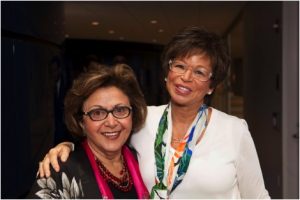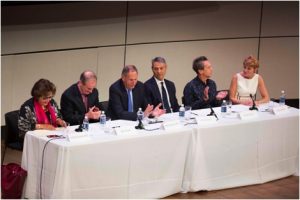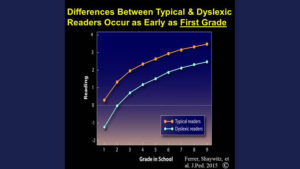2015: A Banner Year
A New Year’s Greeting from YCDC Co-Directors,
Bennett Shaywitz, MD and Sally Shaywitz, MD
December 2015

2015 has been an extraordinary year for all those who care deeply about dyslexia and what happens to dyslexic boys and girls; men and women. Truly, the door has opened and light is beginning to come in for dyslexia.
We, at YCDC, have focused on several major areas deemed critically important to dyslexia:
1. YCDC has worked very hard to increase public awareness of dyslexia and 2015 was a banner year for our efforts, culminating in our “Slow Readers, Fast Thinkers: It Takes a Dyslexic Brain” event held at Yale before an overflow group of attendees. We were honored to have Valerie Jarrett, Senior Advisor to President Barack Obama, give the Opening Remarks. Although not dyslexic herself, she truly understands the reality and impact of dyslexia and spoke of this during her remarks.

Pictured: Valerie Jarrett with Dr. Sally Shaywitz during the October 9th event.
In addition to the Executive Branch of our government, the Legislative Branch, too, was represented by Senator Chris Murphy (CT-D) and by Senator Bill Cassidy (R-LA), the father of a dyslexic child, who delivered impassioned closing remarks about the need to support dyslexia. Speaking of increasing public awareness of dyslexia, both Connecticut Public Radio and Page Six of the New York Post reported on the event.
2. Increasing awareness that dyslexia follows a Sea of Strengths model, a weakness in getting to the sounds of spoken words surrounded by a Sea of Strengths in higher level thinking and reasoning. It is inappropriate and misleading to focus solely on one or the other. And indeed, our incredible panel at the “Slow Readers, Fast Thinkers: It Takes a Dyslexic Brain” event demonstrated just how the weakness touches a dyslexic’s life from childhood to adulthood. Importantly, this panel of renowned men and woman inspired the listeners to learn that despite all the frustrations, they are now at the peak of their career ladders. Indeed, renowned cardiologist Dr. Toby Cosgrove, dyslexic and CEO and President of the Cleveland Clinic, spoke about how when he is asked to lecture, the first question is “What is the title of your talk?” Dr. Cosgrove’s response, “I’m going to talk about the “F” word.” After the shock and look of surprise of his listeners dissipates, he clarifies his title, “I am going to talk about Failure because what all of us dyslexics experience before we reach our success is failure.”
I was honored to moderate this extraordinary panel which, as shown below, joined me seated at the table, all dyslexic, all on top of their field: renowned attorney, David Boies; eminent cardiac surgeon and CEO, Dr. Toby Cosgrove; master talent agent, Ari Emanuel; Academy Award-winning producer, Brian Grazer; and distinguished economist, Diane Swonk, all of whom resonated with Dr. Cosgrove’s remarks.

“It Takes a Dyslexic Brain” Panel, L-R: S.Shaywitz, M.D.; D. Boies; T.Cosgrove, M.D.; A.Emanuel; B. Grazer; D.Swonk
The confirmation of the rocky road fraught with multiple obstacles characterizing the journey of so many dyslexics, yet culminating in great success was especially welcome and inspiring to the many students in attendance, especially the large contingent of our own Yale students. We believe it is crucial to increase awareness of the full, 360 degree reality of dyslexia.
3. Since its first description, over a century ago, dyslexia has been recognized as an unexpected difficulty in reading in individuals who have the ability to be better readers. Unfortunately, in some circles, the basic component of dyslexia — ‘unexpected’ has been overlooked, including in definitions of dyslexia. The good news is now, in 2015, the unexpected nature of dyslexia has been codified by a unanimous Senate vote for the Cassidy-Mikulski Resolution (Resolution 275).
As we wrote earlier, An Important Announcement from YCDC Co-Directors: Bennett Shaywitz, MD & Sally Shaywitz, MD…
“For all those who care about and/or who are touched by dyslexia, there is reason to celebrate, to breathe a sigh of relief and let out a shout of joyful exuberance!! Yes, we are on our way!
HURRAY – A heart-felt thank you to Sen. Bill Cassidy (R-LA) and Sen. Barbara Mikulski (D-MD) for sponsoring bipartisan dyslexia Senate Resolution 275 unanimously passed by the US Senate. Game-changing Senate Resolution 275, at last, provides a resounding positive answer to our dreams expressed in Congressional testimony last September 2014 by: 1) bringing together education and 21st century science, and 2) representing a major step forward in closing the action gap in translating scientific progress in dyslexia into policy and practice. A win for every child (or adult) who is dyslexic, for his or her parents and community and for our entire nation.”
The Cassidy-Mikulski Resolution:
Calling on Congress, schools, and State and local educational agencies to recognize the significant educational implications of dyslexia that must be addressed…
Whereas dyslexia is —
(1) defined as an unexpected difficulty in reading for an individual who has the intelligence to be a much better reader;
Find the full Resolution by clicking here.
4. Increase awareness of the need for early diagnosis and intervention. We, as Co-Directors of YCDC, were grateful to be able to provide quality scientific data to support the critical importance of getting to dyslexic boys and girls at the beginning of their school journey. As we reported in the November 2015 issue of the Journal of Pediatrics, the achievement gap between dyslexic and typical readers is already present in first grade. These data emerging from a longitudinal study indicate, as shown below, a very large achievement is already present in first grade — yes, first grade. This means that waiting for kids to read by grade 3 is waiting too long.
These longitudinal findings demonstrate that even though dyslexic children may make progress and increase their reading achievement over time, the gap is so large that it is difficult to overcome. Children must be screened for possible dyslexia early, waiting is dangerous, if not unethical. Once again, the science is there, educators must now act, and act with a sense of urgency on what the science is showing us: ACT — Screen young children for dyslexia early, identify those at risk and provide proven interventions!

5. Legislation at both the state and federal levels along with internally generated policy statements released by the US Department of Education, are, at last, moving forward. At the federal level, No Child Left Behind has now been replaced by ESSA, the Every Student Succeeds Act, which specifically uses the word dyslexia; there are a growing number of states, including our own state of Connecticut, which have enacted legislation supporting the identification and instruction of students who are dyslexic. Importantly, too, ESSA represents a leap forward in referencing the need to use ‘evidence-based’ (rather than the prior ‘research-based) for any intervention program. As YCDC has often emphasized there is a marked difference between both terms, with evidence-based actually having true evidence that it works; in contrast, research-based simply infers that there is a theoretic basis for believing the program is effective — but without referring to any real evidence, that it is, indeed, effective. Our children need proven programs, rather than those based on theoretical suppositions.
This legislation, not surprisingly, represents a work in progress, and a very positive step in the right direction. Here, we must acknowledge the strong contribution of many of those in Decoding Dyslexia whom I was pleased to call out in a recent Education Week article.
Far too many parents have been told by their schools that the school does not accept a diagnosis of dyslexia; for these parents a new day is dawning. Assistant Secretary of Education, Michael Yudin, in a letter dated October 23, 2015, asserted that schools can and should use the diagnostic term, dyslexia, where appropriate, in educational planning, including IEP’s and intervention descriptions. Good work, Secretary Yudin; please know that it is very much appreciated.
YCDC is both proud and pleased by this game-changing progress. There is more to be done and these accomplishments provide strong reassurance that dyslexia is on its long-delayed road to aligning with 21st century scientific progress. We now know it can be done and we, at YCDC, together with our many, many committed supporters will work to ensure that we move forward with passion and determination and that our website continues to share only the most trustworthy information. In 2016, we will continue to work to taking the next steps in each of our areas of focus:
- increasing public awareness of dyslexia;
- encouraging use of the word dyslexia
- translating the scientific knowledge of dyslexia into policy and practice
- encouraging the most specific and accurate diagnosis of dyslexia
- guiding parents, dyslexic children and educators to come to a 360 degree full understanding of the explanatory Sea of Strengths model
- providing support to dyslexic children and adults so that they may realize their Sea of Strengths
- working toward our goal of having all stakeholders acknowledge and give credence to the unexpected nature of dyslexia;
- putting into effect actions recognizing that the achievement gap occurs very early, indeed, at the very beginning of a child’s educational career and that steps must be put into place now to recognize and address dyslexia early on; and
- ensuring that legislation and educational policy at the local, state and federal level are strongly aligned with, and reflect, both the science of dyslexia and the needs of dyslexic children;
- supporting and disseminating the scientific and ethical basis for providing accommodations to dyslexic students
We welcome 2016; we, at YCDC, are raring to go to work towards making this year an even better one for all — children and adults — who are dyslexic. We can do it, we must do it, we will do it!!
Related
Giving to the Yale Center for Dyslexia & Creativity
The generosity of friends of the Center inspires us and has allowed our Center to make major contributions …
Read MoreDyslexia and Bullying
Bullying intersects with dyslexia particularly in school settings where far too often dyslexia is not identified, the word, dyslexia, not used, and the associated symptoms not addressed.
Read More2016: An Extraordinary Year
This past year was truly extraordinary for all those who care deeply about helping dyslexic boys and girls, men and women get the support they need to reach their full potential. At the Yale Center for Dyslexia & Creativity, our focus has always been on translating scientific knowledge into action. In 2016 that approach paid off in powerful ways from the…
Read MoreRemembering Matthew Badger
It is with profound sadness we share with you the passing of Matthew Badger, a great champion for all who are dyslexic or care for children with dyslexia. Although you may have heard of Matthew from reading about him in newspapers, we were fortunate to get to know him on a more personal level through a mutual friend, Beth Ravelli…
Read More